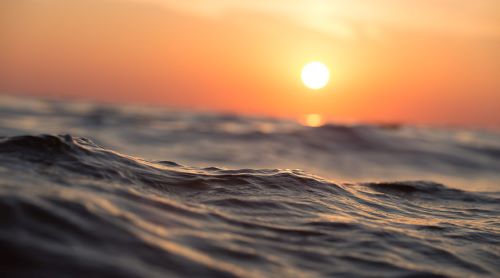Context-
In recent years, climate change has not only led to well-documented ocean warming but has also triggered unexpected phenomena like marine cold waves, which can have devastating effects on marine life. Surface temperatures can rapidly plummet by 10ºC or more over a day or two, leading to prolonged periods of cold conditions known as "cold waves." This phenomenon is the opposite of the more familiar marine heatwaves and has been increasingly observed along the southeast coasts of South Africa and Australia.
The Mechanism Behind Marine Cold Waves
The occurrence of marine cold waves is driven by changes in wind patterns and ocean currents, which can unexpectedly cause seawater to cool rather than warm. This cooling effect is primarily due to a process known as upwelling. Strong winds and currents force warmer surface waters offshore, allowing colder water from deeper ocean layers to replace them. This sudden cooling can have profound impacts on marine ecosystems, disrupting the habitats and behaviors of various species.
In localized areas, such as the east coasts of continents, including South Africa and Australia, upwelling events are increasingly common due to climate change-induced shifts in global wind and current patterns. These changes are leading to more frequent and intense upwelling events, resulting in severe and sudden drops in sea surface temperatures.
Impacts on Marine Wildlife
The consequences of marine coldwaves on marine fauna are alarming. Recent events along the southeast coast of South Africa in March 2021 resulted in the deaths of at least 260 animals across 81 species, including vulnerable species like manta rays and bull sharks. Even highly mobile species such as bull sharks, which typically avoid colder waters during their seasonal migrations, are being affected by these extreme cold snaps.
Case Study: Bull Sharks in Marine Cold waves
Bull sharks, known for their resilience to various environmental conditions, are being increasingly affected by marine coldwaves. Despite their ability to migrate hundreds of kilometers up and down coastlines, these sharks actively avoid areas impacted by upwelling during their seasonal movements. Tracking data from South Africa and Australia reveal that bull sharks take refuge in warm, shallow bays or swim at the surface to escape the chilling effects of sudden cold snaps. However, the severity and duration of recent cold events have proven too much for even these tough predators.
The sudden and significant temperature drops associated with marine coldwaves pose serious threats to marine life, especially tropical and subtropical species that are extending their ranges toward higher latitudes due to overall ocean warming. If these coldwave events become more frequent and intense, mass deaths of marine species could become a common occurrence along mid-latitude east coasts worldwide.
Navigating the Complexity of Climate Change Impacts
While the overarching trend of ocean warming is undeniable, the impacts of climate change on marine ecosystems can be complex and counterintuitive. The expansion of tropical and subtropical species toward higher latitudes exposes them to increased risks from sudden extreme cold events triggered by changing weather and current patterns. This delicate balance highlights the urgency of reducing greenhouse gas emissions and conducting further research to better understand and mitigate the future impacts of climate change on marine biodiversity.
Conclusion
In conclusion, marine coldwaves emerge as a lesser-known yet critical consequence of climate change exerting profound impacts on marine ecosystems. With the global rise in ocean temperatures, localized phenomena such as upwelling-induced coldwaves are imposing significant threats to marine species, particularly affecting highly mobile predators like bull sharks. The escalating frequency and severity of these cold events emphasize the urgent imperative to tackle climate change by curbing emissions and intensifying investments in research to anticipate and effectively mitigate its adverse impacts on marine life.
The intricate and nuanced interactions within marine ecosystems underscore the necessity of embracing holistic approaches to environmental conservation. Addressing the complexities of climate change requires concerted global cooperation, transcending geographical boundaries and political divides. By adopting collaborative efforts on an international scale, we can fortify our resilience against the multifaceted challenges posed by marine coldwaves and other climate-induced phenomena.
As we navigate this dynamic and interconnected ecosystem, the imperative to safeguard marine biodiversity grows increasingly urgent. Investing in sustainable practices and embracing innovative solutions are pivotal steps toward securing the future health and resilience of our oceans. The imperative to act decisively and collectively in combating climate change has never been more compelling. Together, we can pave the way for a more sustainable future, preserving the vitality and diversity of our marine ecosystems for generations to come.
|
Probable Questions for UPSC Mains Exam- 1. How do changes in wind patterns and ocean currents contribute to the occurrence of marine cold waves, and why are these events becoming more frequent along the southeast coasts of South Africa and Australia? (10 Marks, 150 Words) 2. Discuss the vulnerability of marine wildlife, particularly highly mobile species like bull sharks, to marine coldwaves triggered by upwelling events. How are these cold snaps affecting the behaviors and habitats of these species, and what are the implications for marine biodiversity on a global scale? (15 Marks, 250 Words) |
Source- The Hindu







